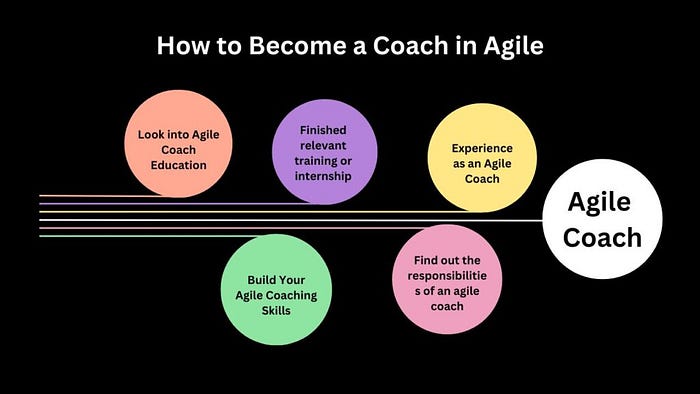Is working as an agile coach a good career choice?
The average earning of an Agile coach can range between $122,000 and $138,000 per year(who works on a multi-team level)! So if you’re looking for a career in tech but don’t want to be a software developer, then it is a great career path for you!
An Agile coach is primarily responsible for training teams in Agile principles and management techniques. They design optimization tactics, assess performances, and conduct training sessions.
They oversee assisting teams in adopting the Agile methodology. Additionally, they answer questions, support organizational growth, and give staff feedback.
A proficient agile coach is able to handle numerous responsibilities, primarily within the digital realm, to aid individuals, teams, and even the entire company in striving for excellence.
They possess the ability to effectively identify problematic scenarios and motivate others to work towards resolving them. Conflict resolution and management of interpersonal relationships are also integral components of their role.
Furthermore, they provide process and behavior coaching, contributing to the reduction of wasteful actions and increasing focus on timely delivery.
What Is Agile Coaching?
The role of an agile coach is to guide corporate teams in comprehending the agile methodology and oversee the progress of agile teams to secure the organization’s triumph.
Their responsibilities lie in assisting teams throughout the implementation process and motivating staff and leadership to embrace the agile framework.
Agile coaches strive to empower agile teams with the essential expertise, resources, and educational opportunities to maximize the potential of agile. Pursuing a career as an agile coach involves obtaining training from the finest programs in agile management.
An Agile Coach’s Role:
Many agile coaches possess specific skills that enable them to carry out their duties. A few of the skills listed are communicative, analytical, and creative skills.
How to Become a Coach in Agile:

- Look into Agile Coach Education:
The right major must always be selected when looking into how to become an agile coach. According to our data, computer science, business, and electrical engineering are the most popular majors for agile coaches.
Before applying for a position, it will be a good idea to enhance your agile coaching abilities. You can go for (ICAgile) ICP-ACC certification.
- Finished relevant training or internship:
The average post-employment, on-the-job training time for agile coaches is less than one month. The knowledge and abilities needed for their particular work and employer are acquired by new agile coaches throughout this time.
- Find out the responsibilities of an agile coach:
Knowing the obligations and duties expected of an agile coach is crucial before making the decision to pursue this career.
- Experience as an Agile Coach:
Project manager, scrum master team lead, and senior project manager are the most typical positions held prior to becoming an agile coach.
The Prospects of Agile Coaching.
The industry of agile coaching has experienced remarkable growth as evident from the inclusion of “Scrum Master” in the list of rapidly expanding professions.
This trend has emerged in sync with the resilience of both the US and global economy, following the economic downturn of 2008.
The agile coaching industry is currently experiencing an increase in demand due to the influx of management consultants. However, this trend is anticipated to decline in the future. Regrettably, businesses have been found to underinvest in agile coaching. The compensation methods for independent agile coaches (contractors) vary considerably.
Here are some recommendations to help with your decision-making:
- Would you say that teamwork is important to you?
When coaching Agile, it is common for one to not entirely present their true self. This is due to the responsibility of helping teams attain excellence, which often goes unnoticed. Despite being responsible for facilitating change, providing support, and managing various outcomes, recognition is seldom awarded for these efforts.
- Do you possess any sort of self-importance or self-esteem?
To become an effective agile coach, one must embody steadfast qualities. Being politically savvy without exhibiting political behavior is crucial. Being supportive and gentle is important, but one should not take on the role of a manager.
Being a protector and absorbing the negative repercussions of sponsors’ erroneous decisions are also essential. Additionally, one should prioritize the team’s interests while considering various circumstances.
- Do you possess a higher level of integrity compared to those within your circle?
As an agile coach, it is crucial to remain steadfast in maintaining one’s values even when no one is observing, as facades are bound to disintegrate eventually.
- Is maintenance of safety and stability of utmost importance to you?
Agile coaching involves a significant amount of disruptive measures that require coaches to challenge poor team practices, modify conventional approaches and deliver potentially difficult feedback to individuals. While always maintaining a professional demeanor, this can put coaches in challenging situations.

Comments
Post a Comment